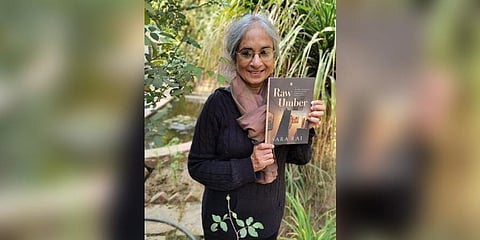

The upsurge in Indian non-fiction has intensified these past few years through a glittering ensemble of greats. Still, to find a true-blue memoir is a rare gift, especially from a relatively low-key writer, known more for her translations and short story collections.
If a memoir offers rather delicious musings and slices of life, Raw Umber by Sara Rai is a banquet of cultural friezes with piquant reminders of who we once were. The text is rich with smells, rooms that have housed generations, creepy crawlies and a growing soul’s fascination for fauna, intricate observations and a slow unfurling of secrets buried in family histories. And this family has as much an open secret as an open wound. For, this is Munshi Premchand’s family: their saga of survival after his early death, while his greatness lives on almost as a physical presence.
The main location is Allahabad, scrambling to find its feet after the British left, and the state capital shifted to Lucknow––the roads, the buildings, the lifestyle, even the choices of food and where to buy specific items like sausages dictated by the style of the Raj. Visible from the terraces is the almost oceanic expanse of the Ganges in monsoon to reduce to a slim ribbon later. Specific to Allahabad is the great number of thinkers and intellectuals, who turn the city into a hub of progressive thought and culture. And it is a rare privilege to view life-like portraits of these environs before development crammed tall apartment blocks obliterating the river view.
Then, there is Benaras and the sprawling Godowlia house, where the Saraswati Press, established and run by Premchand himself, is. It has 36 rooms distributed over four imposing storeys, all of which Rai’s energetic grandmother, Shivrani Devi, walks through in worn wooden clogs. The road outside winds through jammed markets down to the Manikarnika ghat. Feisty and practical, she turned her love for literature into her own works, and when her first short story was published, it caught her famous husband unawares. Also open to accusations that he’d ghost-written it. Though, he wholeheartedly supported her writing career thereafter.
In freewheeling style, the reader is treated to a museum of experiences ––quirky and unique. Delightful to encounter, decades later, the urban myth of that sponge ‘roti’ that doubles every morning in watery ‘tea’ medium, much vaunted as a cure-all. There’s the whimsy of the grandmother’s goat tethered to the grills of a first-floor window in that roomy house in Benaras.
Vignettes of battling stamens of flowers, of the sudden ire of a parent when fruit is cut unintuitively, or the world of English literature and how books ushered us to adulthood–– what makes this a memorable gem and wholly unmissable is the style of writing: poetic and loaded with fact, almost scientific in observation, yet artlessly dissected in the most honest words. As a tribute to Premchand and his clan, no other retelling could be as beautiful.